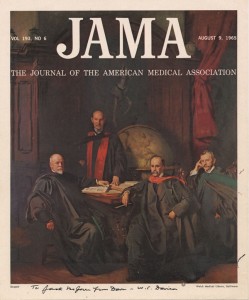Back in May, Evgeny Morozov wrote a review for The New York Times Book Review of two books: The Naked Future: What Happens in a World That Anticipates Your Every Move? by Patrick Tucker and Social Physics: How Good Ideas Spread — The Lessons From a New Science by Alex Pentland. The review is excellent. I’m mostly going to quote from this review (plus one of Morozov’s books), since this is a huge topic in which I have considerable interest but no expertise. I’ve been thinking about a JAMA article I read recently that discusses the need to convince the public to allow extensive use of Big Data in connection with health care (What’s that you bought at the grocery store? You didn’t renew your gym membership?), and Morozov’s ideas seem related. (Morozov, by the way, considers Big Data an “ugly, jargony name.”) Read more
Tag Archives: social media
Recommended (online) reading
 I’m still on “sabbatical.” Mostly reading. Thinking about what I most want to write about. I know what my interests are — the problem is, I have too many. Meanwhile, here are some blogs I enjoy reading.
I’m still on “sabbatical.” Mostly reading. Thinking about what I most want to write about. I know what my interests are — the problem is, I have too many. Meanwhile, here are some blogs I enjoy reading.
Thought Broadcast by Dr. Steve Balt
Psychiatry is a controversial topic these days. We (speaking for myself, anyway) love to criticize the overprescription of psychopharmaceuticals, the medicalization of the slightest deviation from “normal,” and those psychiatrists who are eager to take “gifts” from the drug companies whose products they subsequently prescribe and promote.
I suspect people relate to psychiatry more readily than to the science of medicine. We’ve all known moments of slippage along the spectrum of mental health. We’d all like to understand ourselves better, something psychiatry used to promise before it tried to reduce us to the chemical interactions inside our brains.
Dr. Balt writes about all of this. What I especially like about his blog is his compassion for patients and his honest assessment of the psychiatric profession. His writing has a quality like Gawande’s: He maintains a strong personal presence without straying too far into the overtly personal.
To get a sense of Thought Broadcast, read Dr. Balt’s My Philosophy page. A recent post I’d recommend: How to Retire at Age 27. It’s on psychiatric qualification for disability. His point is that labeling (and medicating) someone as disabled does nothing to solve underlying social problems. It concludes:
Psychiatry should not be a tool for social justice. … Using psychiatric labels to help patients obtain taxpayers’ money, unless absolutely necessary and legitimate, is wasteful and dishonest. More importantly, it harms the very souls we have pledged an oath to protect.
JAMA announces new editor-in-chief
 The American Medical Association (AMA) was founded in 1847, a time of significant change in the practice of medicine and of intense competition among practitioners. It began publishing its peer-reviewed medical journal, The Journal of the American Medical Association or JAMA in 1883. The AMA has just named a new editor-in-chief for that journal, Howard C. Bauchner, a pediatrician from Boston University School of Medicine.
The American Medical Association (AMA) was founded in 1847, a time of significant change in the practice of medicine and of intense competition among practitioners. It began publishing its peer-reviewed medical journal, The Journal of the American Medical Association or JAMA in 1883. The AMA has just named a new editor-in-chief for that journal, Howard C. Bauchner, a pediatrician from Boston University School of Medicine.
The two medical journals in the US that cover general medicine — as opposed to specialties — are JAMA and The New England Journal of Medicine (NEJM, founded in 1812). Both have their strong points. JAMA preserves the humanistic tradition of medicine. Each issue includes poetry, a personal essay, book reviews, and artwork on the cover that’s thoughtfully discussed.
It’s much more stodgy than NEJM, however, at least in my opinion. During the presidential election and then during the debate over health care reform, NEJM published timely commentaries on the issues and made them available online to non-subscribers. It continues to cover topics such as the legal challenges to the health care bill. Not only does JAMA give less space to these issues. Articles in JAMA are not available online without a subscription ($165 for 48 issues).
Reaching the general public in an online world
That may change with the new editor-in-chief. Dr. Rita Redberg, editor-in-chief of the Archives of Internal Medicine (also published by the AMA) told Reuters that JAMA faces the same issues that confront newspapers and magazines these days: “how to live and flourish in this online world.” Read more
What the Internet does to the mind and self
 One of the best things I’ve read on the subject of what the Internet does to our mental processing and social interactions is Adam Gopnik’s The information, How the Internet gets inside us. It was published in The New Yorker and is currently not behind a pay-wall.
One of the best things I’ve read on the subject of what the Internet does to our mental processing and social interactions is Adam Gopnik’s The information, How the Internet gets inside us. It was published in The New Yorker and is currently not behind a pay-wall.
Gopnik discusses the work of a number of writers, including the books Cognitive Surplus, Is the Internet Changing the Way You Think?
, The Shallows
, Hamlet’s BlackBerry
, Alone Together
, and Too Much to Know
. He divides the thinking of these writers into three categories: Never-Better, Better-Never, and Ever-Waser.
The Never-Betters believe that we’re on the brink of a new utopia, where information will be free and democratic, news will be made from the bottom up, love will reign, and cookies will bake themselves. The Better-Nevers think that we would have been better off if the whole thing had never happened, that the world that is coming to an end is superior to the one that is taking its place, and that, at a minimum, books and magazines create private space for minds in ways that twenty-second bursts of information don’t. The Ever-Wasers insist that at any moment in modernity something like this is going on, and that a new way of organizing data and connecting users is always thrilling to some and chilling to others—that something like this is going on is exactly what makes it a modern moment.
Gopnik’s writing is inspired, as in the end of this passage:
[T]he Ever Wasers smile condescendingly at the Better-Nevers and say, “Of course, some new machine is always ruining everything. We’ve all been here before.” But the Better-Nevers can say, in return, “What if the Internet is actually doing it?” The hypochondriac frets about this bump or that suspicious freckle and we laugh—but sooner or later one small bump, one jagged-edge freckle, will be the thing for certain. Worlds really do decline. “Oh, they always say that about the barbarians, but every generation has its barbarians, and every generation assimilates them,” one Roman reassured another when the Vandals were at the gates, and next thing you knew there wasn’t a hot bath or a good book for another thousand years.
I found this next observation insightful. It relates to the offensive behavior so common on the Internet. Read more
WikiLeaks and modern medicine
 “[T]echnology, has created a monstrous genie, that is impossible to put back in the bottle, with out destroying the massive and ever increasing value of the bottle itself.”
“[T]echnology, has created a monstrous genie, that is impossible to put back in the bottle, with out destroying the massive and ever increasing value of the bottle itself.”
That’s a comment on WikiLeaks, but it could be about modern medicine. Just as the Internet changes the world faster than governments can keep up, rapid developments in medicine – genetic enhancement, life extension, cyborgs — require deep and serious thought. What I like about the commentaries I’ve read on WikiLeaks is the willingness to discuss challenging ideas.
Here are some excerpts from a post by Clay Shirky, entitled “Half-formed thought on Wikileaks & Global Action.” (emphasis added) Read more
Wikileaks, nerd supremacy, anarchy, dictatorship, and democracy
 Jaron Lanier, author of You Are Not a Gadget: A Manifesto, has written a penetrating essay on the Information Age, using WikiLeaks to illustrate how romantic idealism can go wrong.
Jaron Lanier, author of You Are Not a Gadget: A Manifesto, has written a penetrating essay on the Information Age, using WikiLeaks to illustrate how romantic idealism can go wrong.
It’s a long article, published in The Atlantic. Here are some of the best parts. I hope these excerpts either save you some time or prompt you to read the whole thing. (emphasis added)
A free flow of digital information enables two diametrically opposed patterns: low-commitment anarchy on the one hand and absolute secrecy married to total ambition on the other. …
[P]eople are unable to resist becoming organized according to the digital architectures that connect us. The only way out is to change the architecture. …
The Internet as it is, which supports the abilities of Anonymous and Wikileaks, is an outgrowth of a particular design history which was influenced in equal degrees by 1960s romanticism and cold war paranoia. …
The Internet can and must be redesigned to reflect a more moderate and realistically human-centered philosophy. …
The existing Internet design is centered on creating the illusion of no-cost effort. But there is no such thing. It’s an illusion born of the idylls of youth, and leads to a distorted perception of the nature of responsibility. …
Blogging: Time to get over it
 Dr. Lisa Marcucci, a trauma surgeon and Associate Professor of Surgery, recently did an interview with me for her very successful blog Inside Surgery. It was an opportunity for me to think about why I blog, among many other things. I talked much more freely about myself than I ever do on my own blog.
Dr. Lisa Marcucci, a trauma surgeon and Associate Professor of Surgery, recently did an interview with me for her very successful blog Inside Surgery. It was an opportunity for me to think about why I blog, among many other things. I talked much more freely about myself than I ever do on my own blog.
The interview is quite long and will be posted in three parts. Here’s an excerpt from Part 1, where Dr. Marcucci asks about the mission of my blog.
I started blogging because I wanted to understand something that changed medicine and ideas about health in the 1970s. Prior to that time, the policies of the Kennedy and Johnson administrations had assumed the state should be responsible for the health of its citizens. When political and economic thinking became more conservative in the 1970s and 1980s, governments began to promote the idea that individuals were personally responsible for their health and should practice healthy lifestyles.
A large segment of the population – mainly the educated and economically secure – welcomed these ideas. Feeling personally responsible for one’s health and practicing healthy lifestyles gives one the reassuring illusion of control. In particular, it’s a good distraction from the things that are beyond individual control, like salmonella in our peanut butter and the superbug MRSA at the gym.
The end of privacy
 Did you know there’s a Gmail feature – Mail Goggles – that will prompt you to solve simple math problems before you hit send? This “soft paternalism” keeps you from doing something you’d regret later. By default, it’s only active late at night on weekends, “when you’re most likely to need it.” You can adjust the settings, though.
Did you know there’s a Gmail feature – Mail Goggles – that will prompt you to solve simple math problems before you hit send? This “soft paternalism” keeps you from doing something you’d regret later. By default, it’s only active late at night on weekends, “when you’re most likely to need it.” You can adjust the settings, though.
Here’s a long article (at NYT) — by a law professor — that discusses the dangers of oversharing and the “behavioral economics of privacy” — the trade-offs we make, consciously or unconsciously, when we decide to reveal or conceal information. (emphasis added)
[A] challenge that, in big and small ways, is confronting millions of people around the globe: how best to live our lives in a world where the Internet records everything and forgets nothing — where every online photo, status update, Twitter post and blog entry by and about us can be stored forever. …
[T]here was the 16-year-old British girl who was fired from her office job for complaining on Facebook, “I’m so totally bored!!”; there was the 66-year-old Canadian psychotherapist who tried to enter the United States but was turned away at the border — and barred permanently from visiting the country — after a border guard’s Internet search found that the therapist had written an article in a philosophy journal describing his experiments 30 years ago with L.S.D. …
The fact that the Internet never seems to forget is threatening, at an almost existential level, our ability to control our identities; to preserve the option of reinventing ourselves and starting anew; to overcome our checkered pasts.
A collective identity crisis
People change. Not just from youthful indiscretion to mature adult, but – ideally – people continue to discover and pursue new interests throughout a lifetime. (emphasis added) Read more
Check out this medical blog
 I have a post today at the blog KevinMD. Check it out.
I have a post today at the blog KevinMD. Check it out.
Dr. Kevin Pho, a primary care physician in New Hampshire, has one of the most successful and popular health and medicine blogs on the web. MedGadget voted it the Best Medical Blog of 2008 and described it as:
an exemplary blog that features timely news and opinion of the latest in medicine, bringing in one of the most devoted audiences and keeping thousands of curious minds satisfied with smart and funny writing. While working on his own blog, Kevin has consistently promoted the rest of the medical blogosphere as a useful and reliable source for medical knowledge and opinion.
Given all that he does – his medical practice, an extremely active blog, writing for the New York Times/USA Today/CNN.com, TV appearances, social media activity – I think Dr. Pho must have a secret source of energy.
I highly recommend his blog. It deserves all the success it has achieved.
Cultural differences: Emoticons
![]() The National Geographic has a nice page (PDF) displaying QWERTY emoticons from the eastern and western hemispheres.
The National Geographic has a nice page (PDF) displaying QWERTY emoticons from the eastern and western hemispheres.
Note the emphasis on the mouth in the West and the eyes in the East.
Emotion/West/East
Happy : – ) (^ _ ^)
Sad : – ( (; _ ;)
Surprised : O (* o *)
Winking ; – ) (^ _ ~)
Laughing : D (^ o ^)
Then there are those emotions frequently needed in the east, but not the west.
Blushing (# ^ . ^ #)
Embarrassed (^ ^ ;)
Apologizing m ( _ _ ) m
And what’s the significance of the need to tilt your head to read western QWERTY emoticons, but the eastern ones are looking straight at you? Not what I’d expect culturally. But perhaps the difference here is that the western versions require fewer keystrokes – we’re in more of a hurry.
Why did health care reform fail? Lack of empathy

Source: The New York Times
Continuing with Abigail Trafford’s analysis of health care reform, the next comparison between the Obama and Clinton failures is the ongoing empathy gap.
Trafford describes an experience she had with supporters of Clinton’s health reform. In 1994 she traveled with the Health Security Express, a busload of individuals who suffered from a variety of illnesses and who were willing to trek around the country making a case for universal health care.
The riders became a target for attacks against the Clintons. At each stop, small but vocal crowds were organized to protest “BillaryCare” and “socialized medicine.” One protester yelled at a woman in a wheelchair: “Go back to Russia!” I was stunned by the vitriol and nastiness of protesters.
FDA video on health fraud: So boring it makes you wonder

Source: Dipity
The Food and Drug Administration (FDA) has a new video on health fraud awareness. A worthy topic. It touches on weight loss products, HIV scams, cures for cancer and diabetes. What’s noteworthy about the video is that it’s SO boring. The inflections of the voiceover are totally inauthentic. It has the pacing of a 1970s newscast. There’s almost no music. It’s not sufficiently interesting to grab and hold anyone’s attention.
News – and not just TV news — has become infotainment. I would be the first to complain that this is a tragedy with major implications. But it’s also a reality. To compete for attention, you need some creativity. The chances that this video had any input from a decent ad agency are slim.
Daily Dose: Climate change: How bad can it get; FDR's death; Yawns; Facebook

Source: Sacramento for Democracy
Climate change
Copenhagen climate summit: Five possible scenarios for our future climate (The Guardian)
Concise summary of what we can expect for each increase of one degree Celcius (1.8 degrees Fahrenheit) in global temperature. Here are a few of the health implications.
1C: “Most of the world’s corals will die, including the Great Barrier Reef. Glaciers that provide crops for 50m people with fresh water begin to melt and 300,000 people are affected every year by climate-related diseases such as malaria and diarrhoea.”
2C: “The heatwaves seen in Europe during 2003, which killed tens of thousands of people, will come back every year. … More than 60 million people, mainly in Africa, would be exposed to higher rates of malaria. Agricultural yields around the world will drop and half a billion people will be at greater risk of starvation. … Glaciers all over the world will recede, reducing the fresh water supply for major cities including Los Angeles.”
Health Culture Daily Dose #17
Additional stories related to health. Categories include: More articles on Health Care Reform, History of Medicine, Medical Journalism, Medical Technology, Medical News, Pharmaceuticals, Pop Culture, Social Media and the Internet, and The So-Called Obesity “Epidemic.”
HEALTH CARE REFORM
A ‘Common Sense’ American Health Reform Plan (The New York Times – Uwe Reinhardt)
After studying this nation’s perpetual “national conversation” on health reform for over three decades now, I am firmly convinced that any health reform that is the product of logical cerebral processes automatically misjudges what Americans appear to see as “simple common sense” in health care.
The Experts vs. The Public on Health Reform (Kaiser Family Foundation)
In repeated Kaiser polls, we see a divide between what experts believe and what the public believes about some of the key issues in health reform. There is a wide gulf on basic beliefs about what is behind the problems in the health care system and key elements of reform.
Is it a stroke? Diagnosing by email
Source: Down Maine Veterinary Clinic
Click photo for larger view.
There’s an email that makes the rounds on the Internet about three signs for identifying a stroke: Can the person smile, raise both arms, and speak a simple sentence.
“The Smile Test” was originally presented at a conference hosted by the American Stroke Association (ASA) in 2003. The ASA makes a point of not endorsing this test as a way to identify stroke. The research that came up with these three signs was based on a very small study.
Stick out your tongue
Since 2006 there’s been an additional sign of stroke circulating in emails: Ask the person to stick out their tongue and see if comes out straight or if it’s “crooked,” that is, if it deviates to one side. This is a less reliable indicator of stroke simply because “crooked” is open to interpretation.
Is the Internet bad for your health?

Source: Mayo Clinic
Do you research medical information on the Internet? Do you use Google as your starting point? Do you read entries on medical conditions at Wikipedia and assume what you read is accurate and complete?
Kevin Pho, primary care physician and author of the popular medical blog KevinMD.com, has a column in USA Today on the use of Wikipedia by patients and doctors:
“I researched my condition on Wikipedia.” That’s what more doctors, myself included, are hearing from patients every day.
One reason online medical research leads to Wikipedia is that two-thirds of health inquiries start with a search engine, such as Google. Wikipedia entries appear near the top of search results. Are patients influenced by what they find? Half of those who did Internet research say it made a difference in how they took care of themselves or someone else.
Pharmaceutical companies caught in the act
Wikipedia is a great resource, and its popularity and success are well-deserved. However, its entries can be manipulated by anyone who values their own profit or reputation more than accuracy.
The video of Neda Soltan’s death
 Even though I’ve been writing about Arash Hejazi (here and here), the doctor seen in the video of Neda Agha-Soltan’s death in Iran, I have to admit I still haven’t seen the video. I realized early on that I didn’t want to watch someone die a tragic and violent death. I didn’t want to see her alive and then see her dead. Every second in real time. I don’t need to watch the video to understand why Soltan’s death is so symbolic or why the widespread viewing of it is significant.
Even though I’ve been writing about Arash Hejazi (here and here), the doctor seen in the video of Neda Agha-Soltan’s death in Iran, I have to admit I still haven’t seen the video. I realized early on that I didn’t want to watch someone die a tragic and violent death. I didn’t want to see her alive and then see her dead. Every second in real time. I don’t need to watch the video to understand why Soltan’s death is so symbolic or why the widespread viewing of it is significant.
It could have been 20 years ago that I watched a PBS broadcast about a women who prepared to kill herself. She filmed the entire sequence: Her thoughts, the elaborate preparations, and the actual death. What struck me was not that I watched someone die, but that the event was filmed and presented for public consumption. I believe assisted suicide can be a rational decision when there is incurable, intolerable pain. I don’t find witnessing an actual death in a documentary helpful in thinking about this issue.
The video of Neda Soltan’s death
 Even though I’ve been writing about Arash Hejazi (here and here), the doctor seen in the video of Neda Agha-Soltan’s death in Iran, I have to admit I still haven’t seen the video. I realized early on that I didn’t want to watch someone die a tragic and violent death. I didn’t want to see her alive and then see her dead. Every second in real time. I don’t need to watch the video to understand why Soltan’s death is so symbolic or why the widespread viewing of it is significant.
Even though I’ve been writing about Arash Hejazi (here and here), the doctor seen in the video of Neda Agha-Soltan’s death in Iran, I have to admit I still haven’t seen the video. I realized early on that I didn’t want to watch someone die a tragic and violent death. I didn’t want to see her alive and then see her dead. Every second in real time. I don’t need to watch the video to understand why Soltan’s death is so symbolic or why the widespread viewing of it is significant.
It could have been 20 years ago that I watched a PBS broadcast about a women who prepared to kill herself. She filmed the entire sequence: Her thoughts, the elaborate preparations, and the actual death. What struck me was not that I watched someone die, but that the event was filmed and presented for public consumption. I believe assisted suicide can be a rational decision when there is incurable, intolerable pain. I don’t find witnessing an actual death in a documentary helpful in thinking about this issue.
Health Culture Daily Dose #4
In today’s Dose:
Health care reform
(Public option; Gawande’s article)
Health news
(Parkinson’s and pesticide)
Sleep
(Sleep and mental illness)
Social networking technology
(The digital brain and higher education)
Health care reform
- The Washington Post reports that there is no ‘public option’ in the Senate’s health care draft.
The absence of a “public option” marks perhaps the most significant omission. Obama and many Democrats had sought a public option to ensure affordable, universal coverage, but as many as 10 Senate Democrats have protested the idea as unfair to private insurers.
- In a roundtable discussion at Health Affairs, panelists talk about Atul Gawande’s New Yorker article on McAllen, Texas and about geographical variations in health care costs (the Dartmouth Atlas Project).
One of the first questions discussed is why the Gawande article has aroused so much interest. Other questions addressed: Have things changed enough since Nixon’s time so that health care reform can succeed this time around? Can physicians be moved away from fee-for-service payments? Can we change how specialists and primary care physicians are paid?
[S]ome of the finest, most well-respected multispecialty groups will acknowledge in confidence that they’re able to ask for 200 or even 250 percent of Medicare [costs] to do what they are doing very well. … this issue of market power is a real one. …
I agree we need to strengthen primary care, but I think it’s a little bit of a chicken and egg issue as well. Who would want to go into primary care in the current work environments?
Health Culture Daily Dose #3
In today’s Dose:
Health care reform
(Gawande radio interview; Public option)
Health news
(Bayer and prostate cancer)
Obesity politics
(Michelle Obama)
Social networking technology
(Doctors on Twitter and email)
Health care reform
- National Public Radio has an interview with Atul Gawande about his recent New Yorker article. It’s 30 minutes and covers much the same material as the article. At the end, the interviewer asks Gawande what it was like to learn that Obama and his staff were reading and discussing the article. His reply:
Completely shocking. This is the dream you have, that anything you write is absorbed by the people who affect your life. And right now the folks in Washington are deeply important to us as patients and as clinicians, and so it felt like a victory. At the same time I also knew that the brickbats would come and I had better suit up.
(Thanks, Joanne, for the heads up.)
- More on the fate of the public option: Marie Cocco on AlterNet, “Warning: Health Care Lobbyists Are Winning the Battle to Screw All of Us,” and Digby on Hullabaloo, “But I Thought Tom Daschle Was So Crucial To Real Health Care Reform.”
From Cocco:
Advocates of a single, national insurance system that would involve explicit cost controls and guidelines for care — that might put an end to such wasteful practices as over-testing — have been shunted aside. This is in part because Democrats quiver when Republicans call them “socialists.” But Republicans cry “socialist” even when Democrats promote weak reforms that barely nick the vested interests. That’s what’s happening now. No one has seriously proposed an overhaul that would achieve what a single-payer system has been shown to accomplish in most other countries: universal coverage with lower costs that delivers better results than we now get in the United States.
From Digby:
Financing was always going to be a problem. … [W]atching Baucus run for cover, watching Daschle do the old el foldo, I’m seriously pessimistic that anything out of Washington will meet the expectations of anyone in the country.



